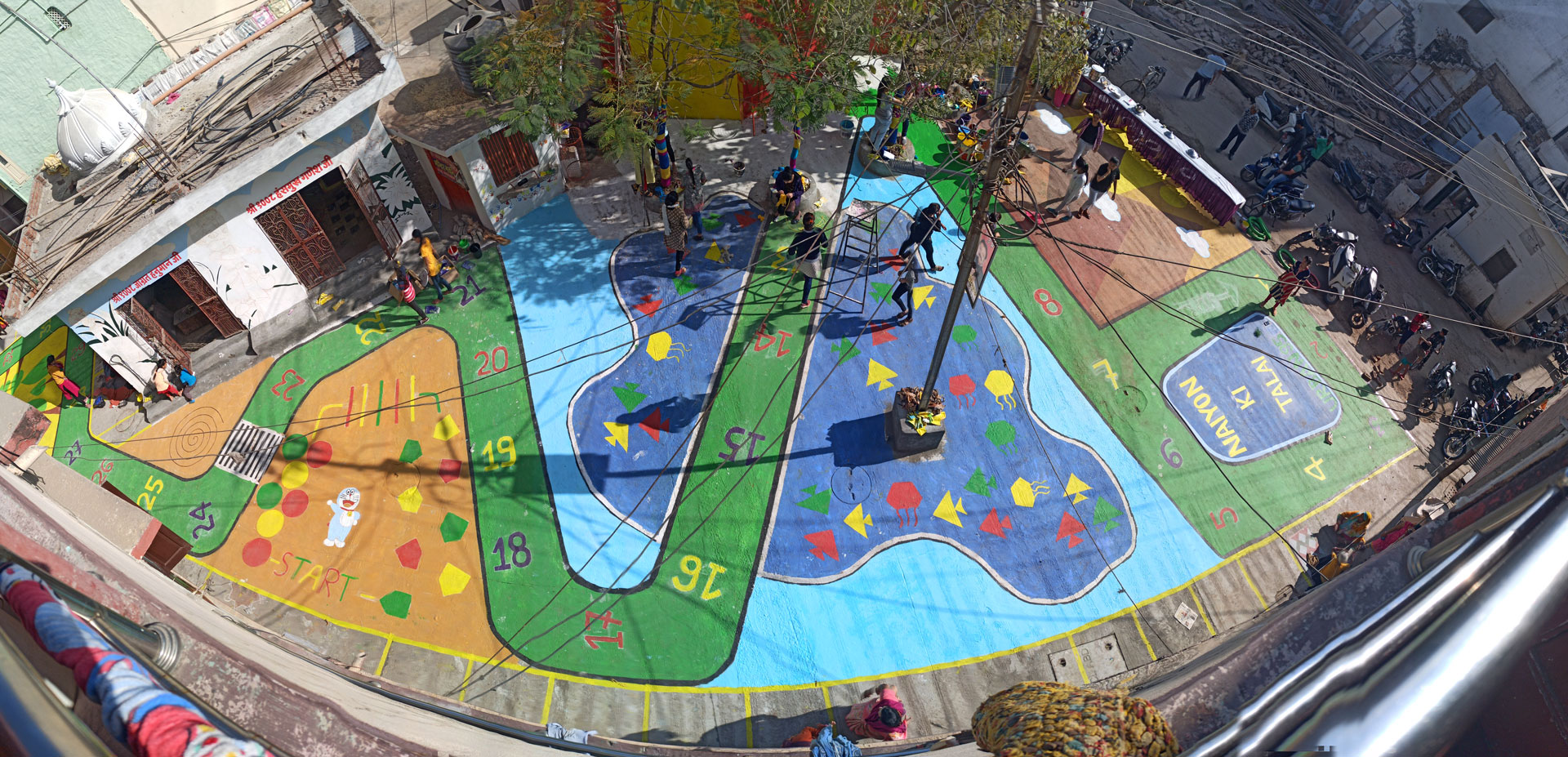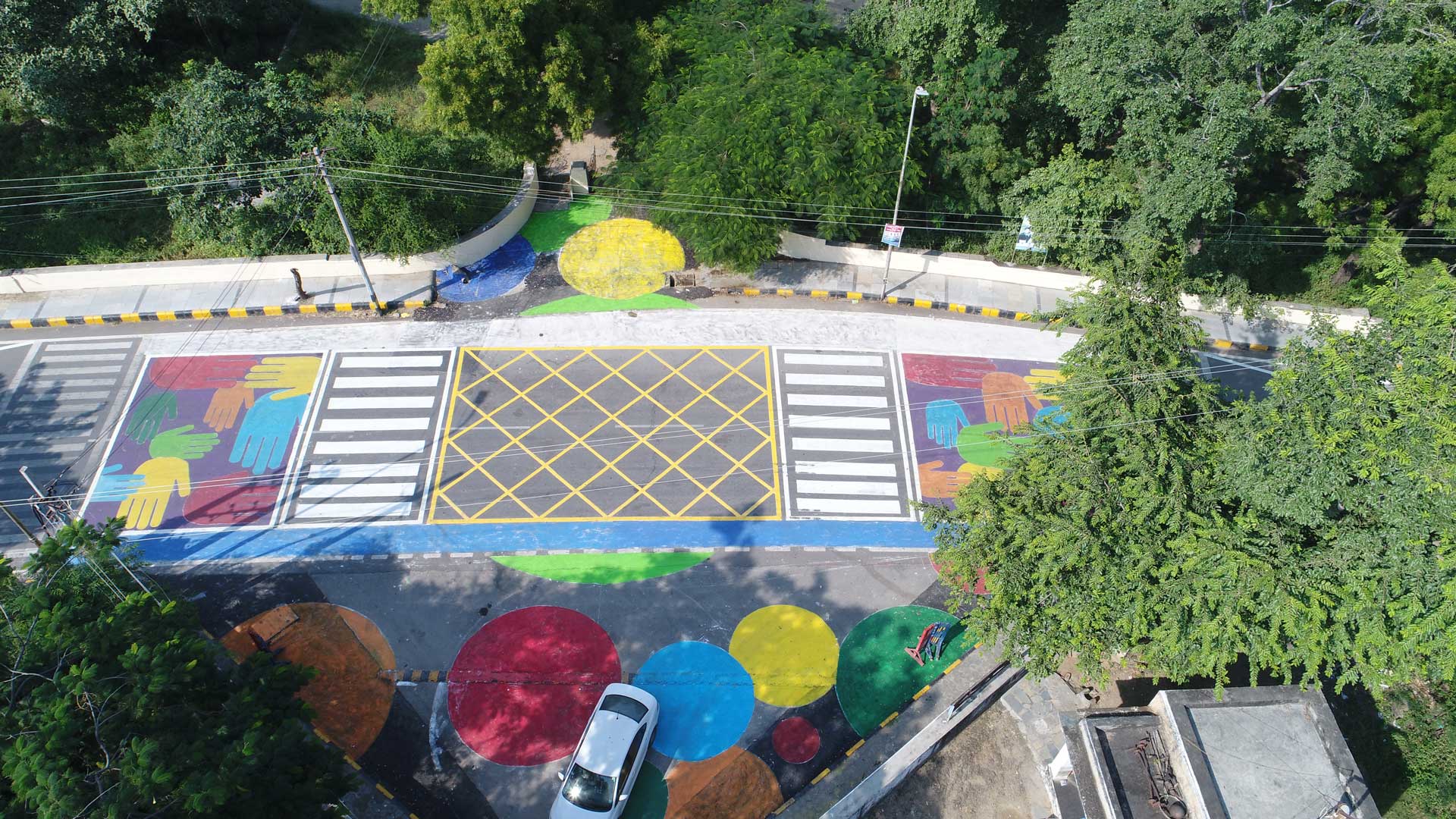Tactical urbanism focused on children can help cities adapt to climate change
Udaipur offers an early example of how to begin
Udaipur offers an early example of how to begin
 Activated public space at Nayion Ki
Talai Chowk. Photo: Courtesy of ICLEI South Asia
Activated public space at Nayion Ki
Talai Chowk. Photo: Courtesy of ICLEI South Asia
In 2019, Udaipur’s city government took on a challenging project: to map how well the city’s built environment meets the needs of infants, toddlers and caregivers. Their findings, shared in the Urban95 baseline assessment report (ICLEI South Asia et al., 2020a), pinpointed the need to redevelop open green spaces, and make them accessible for walking, cycling and electric vehicles. While the interventions that have since been implemented primarily aim to make Udaipur more child-friendly, many will also help the city adapt to climate change.
Udaipur is a historic city, founded in 1559, with just under half a million inhabitants. Its hot, dry climate is alleviated by its network of lakes and over 200 parks and green spaces, which make the cit picturesque and popular with tourists. However, rapid urbanisation has reduced the city’s green cover per resident by 45% since the 1970s.
The Urban95 report found that Udaipur’s blue–green areas need better maintenance and must become easier for families to access. Over 75% of caregivers surveyed said they would like more green cover and shade in the city. More than 80% said they feel unsafe while walking on Udaipur’s streets or accessing shared transport, both because the air is polluted by diesel-fuelled auto rickshaws, and because vehicles travel at dangerously high speeds.
‘Udaipur’s blue–green areas need better maintenance and must become easier for families to access. Over 75% of caregivers surveyed said they would like more green cover and shade in the city.’
Udaipur was one of the first Indian cities to focus its development approach on its youngest citizens through the Urban95 programme. Municipal leaders began implementing initiatives in October 2019 together with the city government (Udaipur Municipal Corporation ) and ICLEI SA (Local Governments for Sustainability South Asia).
These initiatives included the following:
In a “tactical urbanism” intervention – a quick, low-cost temporary project designed to demonstrate the potential for permanent change – brightly coloured markings were painted on the road outside a school at Vidya Bhawan Crossing in late 2019. This led to more children and caregivers walking to and from school, as they felt safer while crossing streets. This in turn resulted in fewer vehicles coming to pick up and drop off children, contributing to reduced carbon emissions and better air quality around school buildings (ICLEI South Asia et al., 2020b).
This tactical measure in the old city of Udaipur demonstrated how a ‘dead’ public square could be revived by reorganising it to encourage community play and interaction. The square at Naiyon Ki Talai Chowk used to be used haphazardly for parking vehicles and dumping garbage. Designating a clear space for parking led to the rest of the square becoming a vibrant and lively community space where people could bring their children. It also helped to improve the environment as people switched from dumping their garbage to using municipal waste disposal and recycling services (ICLEI South Asia et al., 2020c).

Traffic calming measures outside Vidhya Bhawan Pre-primary School. Photo: Courtesy of ICLEI South Asia
Improving green pockets Part of Meera Park in Bhatiyani Chowhatta, a large community park, had fallen into disrepair through lack of maintenance. It was overgrown with weeds and used for dumping garbage, which led to unpleasant smells. Most of its infrastructure was broken, including the access path, rides, benches and lighting. The Urban95 team engaged local people to rejuvenate the space into an attractive park, which started to be used not only by the community in the immediate vicinity but also by residents from nearby areas. Better upkeep of the plants and vegetation, and improved awareness about proper waste disposal, helped to improve the surrounding environment and microclimate (ICLEI South Asia et al., 2020d).
A two- day festival in a city park demonstrated the demand for green open spaces for young children. After being redeveloped, the Manikya Lal Verma park at Dudh Talai was opened with a festival. The event attracted over 1,300 children and caregivers, who participated in activities such as storytelling and planting seeds and saplings, which will contribute to the greening of Udaipur. The storytelling sessions also conveyed messages about the environment and climate change (ICLEI South Asia et al., 2020e).
‘Cities need encouragement, inspiration and support to find solutions that will both make them more resilient to climate change and improve urban life for young children.’
Udaipur’s work to become more child-friendly has been recognised by the Government of India as an example for other cities. In addition to the Urban95 report, it also developed a climate resilient city action plan, based on an assessment of emissions from different sectors and vulnerability to climate change. Udaipur recently ranked 32 out of 126 cities in the Indian government’s Climate Smart Cities Assessment Framework. Based on the above experiences, and as part of its participation in other national government programmes such as the Nurturing Neighbourhoods Challenge and Streets for All, the city of Udaipur has allocated a separate budget for improving green areas and planting more trees.
India is urbanising quickly, and its population is young. Many Indian cities have the scope to improve infrastructure for young children, including schools, healthcare and play facilities, as well as the broader environment. Cities need encouragement, inspiration and support to find solutions that will both make them more resilient to climate change and improve urban life for young children. Udaipur offers an early example of how to begin.
All references can be found in the PDF version of the article.
See how we use your personal data by reading our privacy statement.
This information is for research purposes and will not be added to our mailing list or used to send you unsolicited mail unless you opt-in.
See how we use your personal data by reading our privacy statement.